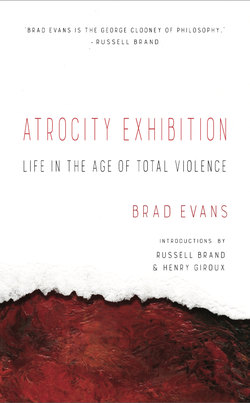Читать книгу Atrocity Exhibition - Brad Evans - Страница 12
На сайте Литреса книга снята с продажи.
ОглавлениеNew Thinking is Needed About September 11
Brad Evans & Simon Critchley
Thursday, 31 August 2011
THE TEN-YEAR DISTANCE from the attacks of September 11, 2001, gives us an opportunity to reflect on the significance of that day’s violence. Common sense asserts that our world is changed forever because of 9/11. But if true, shouldn’t we have spent more time considering the stakes of the event? The attacks were abhorrent and criminal, but our response so far represents a profound failure of the political imagination.
The many human faces to the tragedy provided a passing glimpse into a genuine ethical response mobilized by grief. But all too quickly the mourning ended as matters turned to the usual militarism. The invasion of Afghanistan, the illegal bombardment of Iraq, the establishment of torture camps and, most recently, the execution of Osama bin Laden.
Perhaps this shouldn’t surprise. Despite paying lip-service to global security, peace, and justice, the West’s history is marked by violence against those who refuse to capitulate to it. After 9/11, Giorgio Agamben wrote that security was fast becoming the main criterion of political legitimacy. Elections would be won on claims to protect domestic populations from rogue elements. This means taking the fight to enemies who, it seems, hate our existence. But when this happens, the state can itself become a terrorist entity.
Our political response has been pitiful. The left accuses the right of suffocating politics by taking advantage of so-called “exceptional” conditions. The right accuses the left of blindness to the ideological dangers of Islamofascism. The left condemns the unmediated abuse of power but supports or remains silent on NATO-led violence. The right draws connections between Islam and one of the most shameful episodes in modern history to justify violence.
Without trying to critically understand why people support the willful oppression and slaughter of “others” — especially within the shallow remit of international “norms” — our justification to control through violence is rarely questioned.
Modern politics is infected by a utilitarian mindset that bets the future against the present. “Our present actions are justified because they will make the world a better place” is a hypothesis that cannot be disproved. But these supposedly reasoned deliberations have underwritten the collateral slaughter of millions. Nor can they answer these questions: when is too much killing enough, and how many deaths must there be before a well-intentioned action loses its moral credibility?
We require new ethical ways of thinking about living in a radically interconnected world.
Originally published in somewhat different form in The Guardian.
